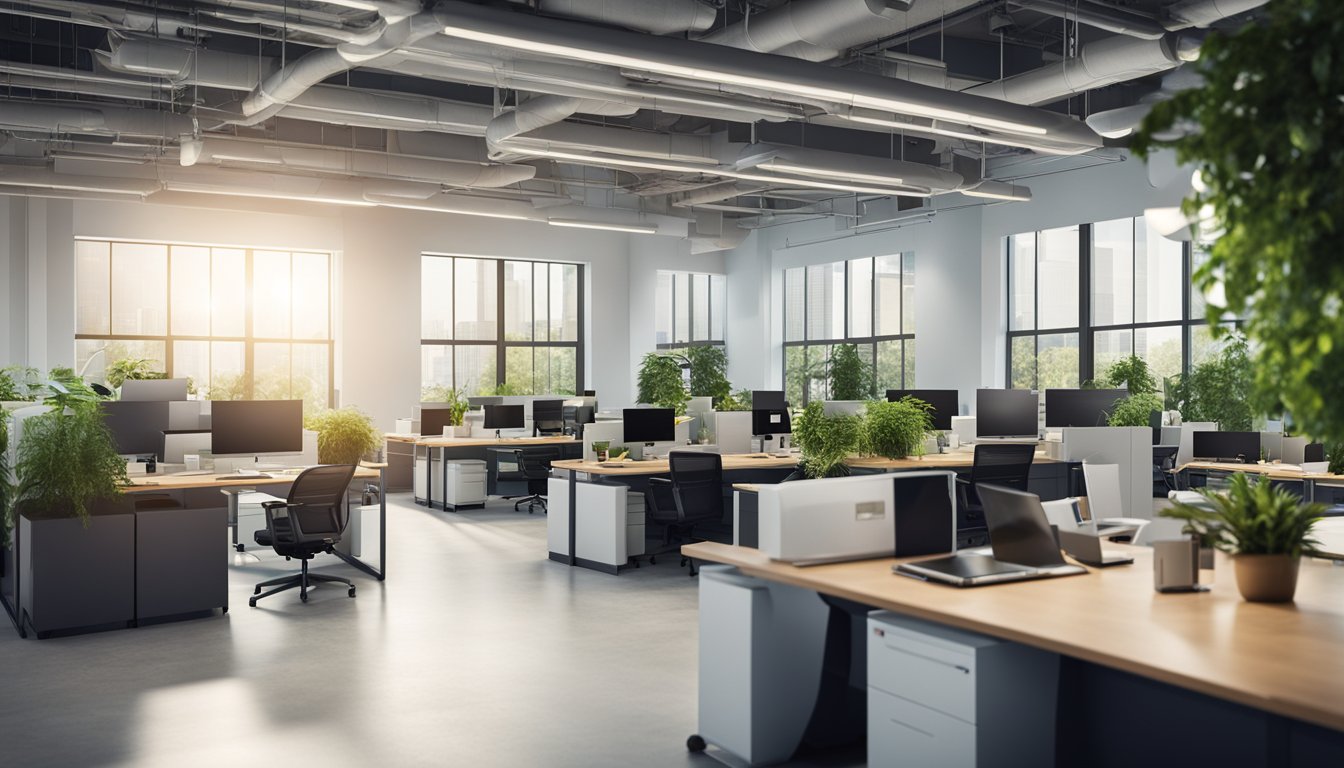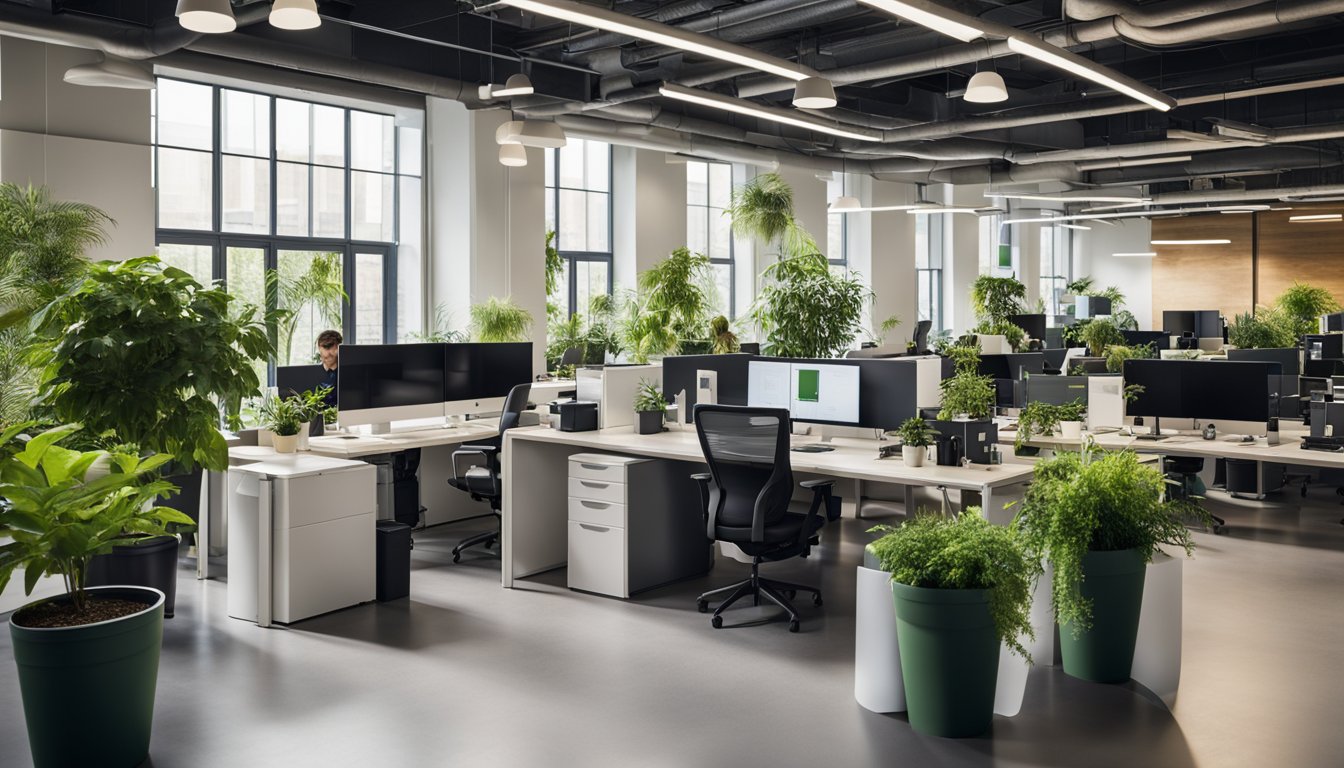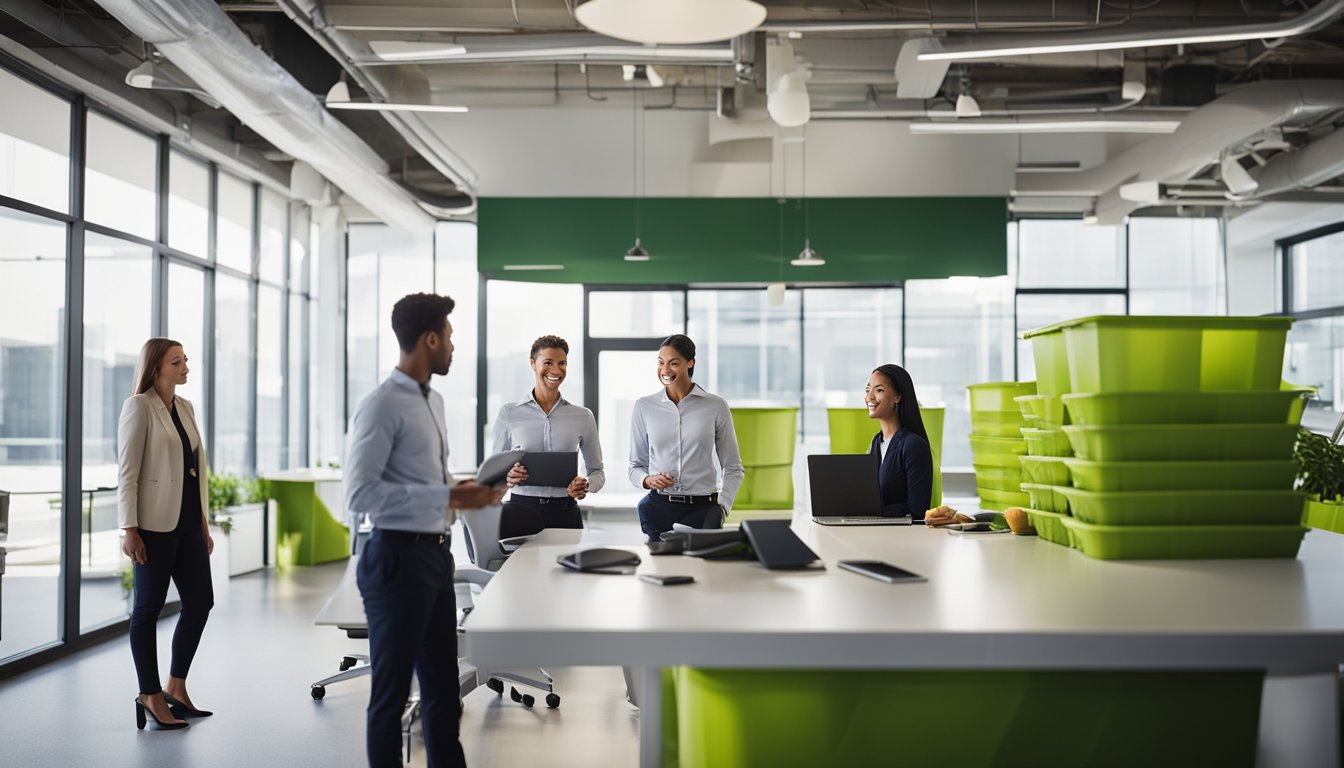Late updated: 14 Dec 2024 14:12
Written by: Amber Collins
Adopting Sustainable Practices For UK Office Efficiency: Boosting Productivity and Cutting Costs
In an era where environmental consciousness is more important than ever, UK offices are increasingly at the forefront of adopting sustainable practices. As we recognise the crucial link between eco-friendly operations and enhanced business performance, it becomes evident that prioritising sustainability is no longer just an ethical choice but a strategic one. By implementing practices that emphasise energy efficiency, waste reduction, and conscious procurement, we've witnessed tangible improvements in both environmental impact and workplace productivity.

Our commitment to fostering sustainability goes beyond mere compliance with regulations. It involves building a workplace culture that values and integrates these practices into everyday operations. Encouraging the use of energy-efficient technology and reducing paper waste not only contributes to a healthier planet but also creates a more engaging and productive office environment. As businesses, we have the opportunity to lead by example, setting a standard for sustainable workspaces across the country.
Key Takeaways
- Sustainable practices improve office efficiency.
- A culture of sustainability enhances productivity.
- Energy efficiency reduces environmental impact.
Essentials of Sustainable Office Practices in the UK
In transforming offices into more sustainable environments, a focus on building energy-efficient spaces and implementing resource management strategies is vital. Embracing circular economy principles can significantly reduce waste and encourage the use of sustainable materials.
Building a Sustainable Office Environment
Creating a sustainable office is about more than just reducing energy consumption. It involves integrating eco-friendly design concepts like biophilic design, which enhances natural light and uses indoor plants to improve air quality. A well-thought-out office layout enhances space utilisation, creating an environment that fosters both productivity and sustainability.
Adopting these practices not only improves general well-being but also lowers operational costs. By choosing sustainable materials such as recycled wood and prioritising energy-efficient appliances, we can reduce our environmental impact. Implementing LED lighting and smart HVAC systems further contributes to a greener workplace.
Energy and Resource Management
Effective resource management involves reducing consumption and maximising efficiency. Leveraging renewable energy sources such as solar panels and green energy can drastically cut carbon emissions. Switching to energy-efficient lighting and utilising smart thermostats can enhance energy conservation efforts.
Water conservation is equally important. Installing systems for rainwater harvesting and optimising waste management by recycling and composting are key steps. We should promote recycling schemes and use recycled paper and materials wherever possible, contributing to significant waste reduction.
Adopting a Circular Economy Approach
The circular economy focuses on minimising waste and making the most of resources. In a paperless office, transitioning towards digital documentation reduces paper waste significantly. Using reusable containers and reducing packaging are practical measures offices can take.
We must encourage upcycling and the use of durable goods to minimise waste disposal. Setting clear sustainability goals and reduction targets ensures we maintain focus on reducing our carbon footprint. Establishing flexible recycling initiatives supports a culture of sustainability that permeates all office activities.
Achieving a sustainable office environment requires commitment and continuous effort. By focusing on these essential practices, we can set a standard that prioritises both environmental health and business efficiency.
Fostering a Sustainable Workplace Culture

Creating a sustainable workplace culture requires us to integrate eco-friendly practices into daily operations, actively engage employees, and promote accessible sustainability. This holistic approach ensures we not only meet environmental goals but also enhance employee satisfaction and productivity.
Incorporating Sustainability in Everyday Operations
We can start by adopting sustainable office supplies and eco-friendly materials. Opt for items made from recycled materials and choose suppliers with sustainability certifications like ISO 14001.
Digital documentation reduces paper waste, promoting a more sustainable workspace. Energy-efficient lighting and the integration of natural light help minimise energy consumption while enhancing comfort. Implementing flexible work policies, such as encouraging remote work or carpooling, contributes to reducing our carbon footprint. Sustainable procurement should guide our decisions, ensuring compliance with rigorous environmental standards.
Engaging Employees and Stakeholders
Engaging everyone in the journey towards a sustainable workplace is crucial. Focus groups and surveys can help gauge employee interest in eco-friendly practices. By involving staff in sustainable design decisions or office refurbishment projects, we foster a sense of ownership in our sustainability goals.
This involvement boosts employee engagement and wellbeing, directly affecting employee productivity and our brand reputation positively. Collaborative efforts, where employees and management align on ESG goals, create a culture of shared responsibility. Recognising employee contributions through incentives can further motivate sustainable behaviour.
Promoting Sustainable Accessibility
A sustainable workplace is also an accessible one. Encouraging green commuting options, such as cycling or using public transport, supports a flexible and inclusive approach.
Designing flexible workspaces that accommodate different needs ensures every employee thrives. Incorporating greenery into office spaces not only improves air quality but also provides a calming environment, promoting health and wellness.
Accessibility ensures that everyone, regardless of physical ability or work schedule, can participate fully in our sustainable future. By prioritising such initiatives, we support a workplace culture that values diversity and sustainability equally, enhancing both innovation and collaboration across our teams.
Frequently Asked Questions

Incorporating sustainable practices into UK offices can significantly enhance energy efficiency, workplace culture, and productivity. Various measures and initiatives can be implemented by both management and employees to create a greener office environment.
What measures can UK offices implement to enhance energy efficiency?
UK offices can increase energy efficiency by integrating efficient lighting systems, utilising smart meters, and adopting motion-sensor technology in common areas. Upgrading to energy-efficient appliances also plays a crucial role. Implementing these measures not only reduces operational costs but also lessens environmental impact.
How can sustainability initiatives be effectively integrated into workplace culture?
To effectively integrate sustainability initiatives, it's essential to foster an inclusive culture. Providing sustainability training and workshops is key, as well as encouraging participation in eco-friendly challenges. Management should lead by example, demonstrating commitment to reducing energy consumption and waste.
What are the best examples of sustainable practices that have been successfully adopted by UK companies?
Several UK companies have adopted exemplary sustainable practices. For instance, Marks & Spencer has embraced eco-friendly store designs and waste reduction strategies. Unilever prioritises minimising carbon emissions across its supply chain. These cases highlight the positive impact and feasibility of implementing sustainability in business operations.
In what ways can employee-led sustainability initiatives contribute to a greener office environment?
Employee-led initiatives encourage grassroots involvement in sustainability efforts. Setting up green teams can drive projects such as recycling campaigns and awareness programmes. Empowering employees to spearhead these initiatives inspires collective action and enhances commitment to sustainability goals.
How do sustainability policies impact the overall productivity of an office?
Sustainability policies foster a healthier, more appealing work environment, which can boost employee satisfaction and productivity. Energy-efficient designs often enhance comfort, such as optimal lighting and air quality, leading to improved focus and work performance.
What actions can offices take to reduce waste and promote recycling?
Offices can implement comprehensive recycling programmes and reduce waste by minimising paper use through digital solutions. Encouraging the use of reusable items, such as cups and containers, can significantly cut down single-use plastics. Regular audits also help identify areas for improvement in waste management practices.
